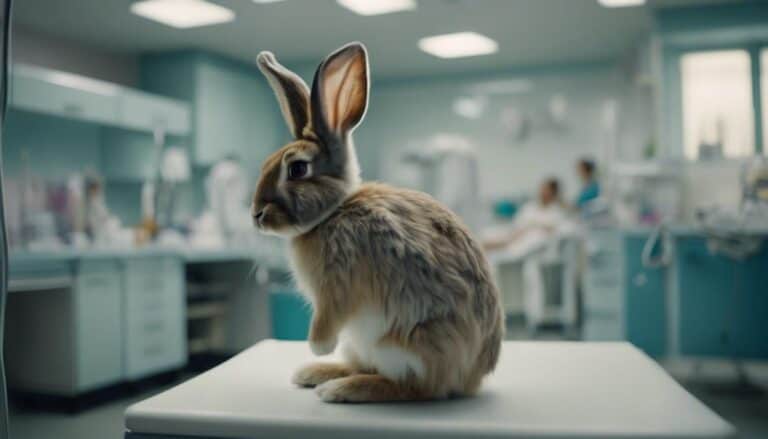Having a pet rabbit can really calm you down and bring some joy to your daily routine. Their soft twitching noses and hopping around can be pretty endearing.
But there’s more to having a pet rabbit than what you see on the surface.
For instance, they have specific dietary needs that you need to cater to. Rabbits are herbivores, so they need a diet rich in fiber and low in protein. You’ll need to provide them with plenty of fresh veggies, hay, and limited amounts of pellets.
Rabbits also have unique behaviors that can be quite fascinating. They’re crepuscular, which means they’re most active at dawn and dusk. They’re also nocturnal, so be prepared for some midnight hopping around.
As you get to know your rabbit better, you might be surprised by the depth of their personalities. Some rabbits are bold and curious, while others are shy and timid. You’ll find yourself forming a special bond with your furry friend, and that’s incredibly fulfilling.
Contents
- 1 Key Takeaways
- 2 Lifespan of Pet Rabbits
- 3 Indoor Living Preferences
- 4 Behavior Similarities With Wild Rabbits
- 5 Active and Curious Nature
- 6 Social and Affectionate Tendencies
- 7 Grooming and Hygiene Needs
- 8 Dietary Requirements and Habits
- 9 Training Possibilities for Rabbits
- 10 Health and Veterinary Care Aspects
- 11 Conclusion
Key Takeaways
So you’re thinking of getting a pet rabbit? That’s a great idea! But before you bring one home, it’s essential to know what it takes to care for these adorable creatures.
For starters, rabbits need regular grooming to stay clean and healthy. This includes brushing their fur, trimming their nails, and taking care of their teeth. Dental care is crucial, as rabbits’ teeth grow continuously, and misaligned teeth can cause serious health issues.
When it comes to food, rabbits need a high-fiber diet that’s rich in hay, limited in veggies and fruits, and supplemented with quality pellets. A balanced diet is vital for their overall health and digestive system.
Rabbits are social animals that thrive on interaction, so it’s crucial to spend quality time with them. They form strong bonds with their owners and enjoy playing, cuddling, and exploring their surroundings. Socialization is key to developing a friendly and affectionate pet rabbit.
To keep your rabbit happy and healthy, you’ll need to provide a safe indoor environment with plenty of space for exercise and exploration. This means setting up a spacious cage or enclosure that’s rabbit-proofed and equipped with hiding places, toys, and climbing structures.
Last but not least, regular vet check-ups, spaying or neutering, and vaccinations are crucial for a rabbit’s health. These preventive measures will protect your pet from diseases and ensure they live a long, healthy life.
Lifespan of Pet Rabbits
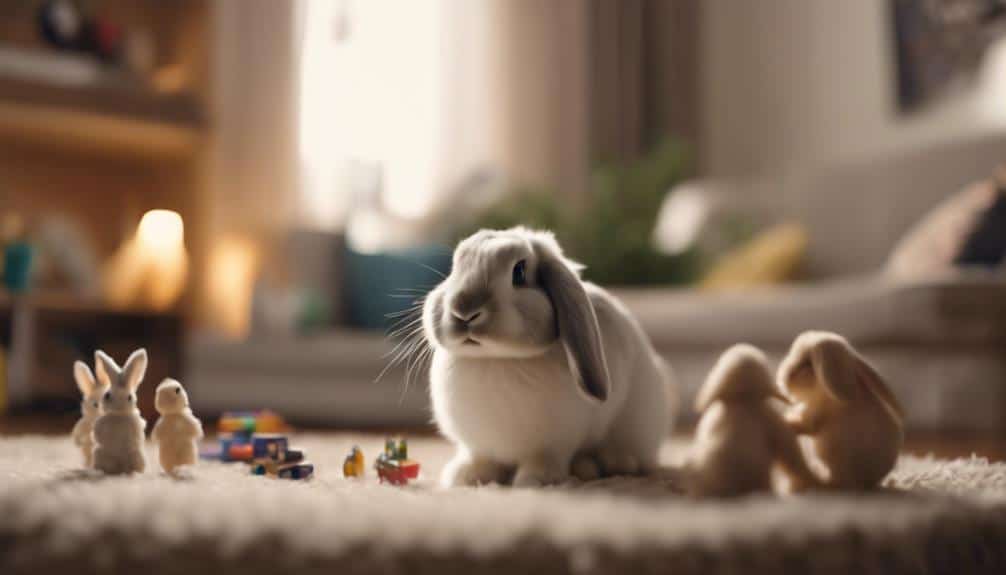
Having a pet rabbit is a big responsibility, since they can live up to 15 years with proper care and attention. On average, pet rabbits live for 8 to 12 years, but this can vary depending on their breed, diet, and living conditions.
Some breeds, like the Netherland Dwarf, tend to live shorter lives, typically between 7 to 10 years. Larger breeds, like the Flemish Giant, can live up to 10 to 15 years. If you spay or neuter your rabbit, they can live longer, typically between 10 to 12 years.
To ensure your rabbit lives a long and healthy life, regular veterinary check-ups are essential. You should also provide a balanced diet rich in hay and vegetables, and a safe living environment. By doing so, you can extend your rabbit’s lifespan and give them a happy and fulfilling life.
Indoor Living Preferences
Rabbits really benefit from living indoors. They’re protected from predators and harsh weather, and it’s easier to keep an eye on their health and well-being.
When you’re setting up your rabbit’s indoor space, make sure it’s big enough for a spacious enclosure or cage, as well as areas for exercise and play.
This way, you can keep a close eye on your rabbit’s health, behavior, and diet, which makes it easier to take good care of them.
One of the best things about indoor living for rabbits is that you can litter train them. This makes cleaning up after them a breeze, and it’s way more practical and convenient.
Indoor environments also give you more control over the temperature, humidity, and noise levels, which can really help reduce stress and make your rabbit feel more comfortable.
Providing a safe, comfortable, and stimulating indoor living space is essential for your pet rabbit’s health and happiness.
Behavior Similarities With Wild Rabbits
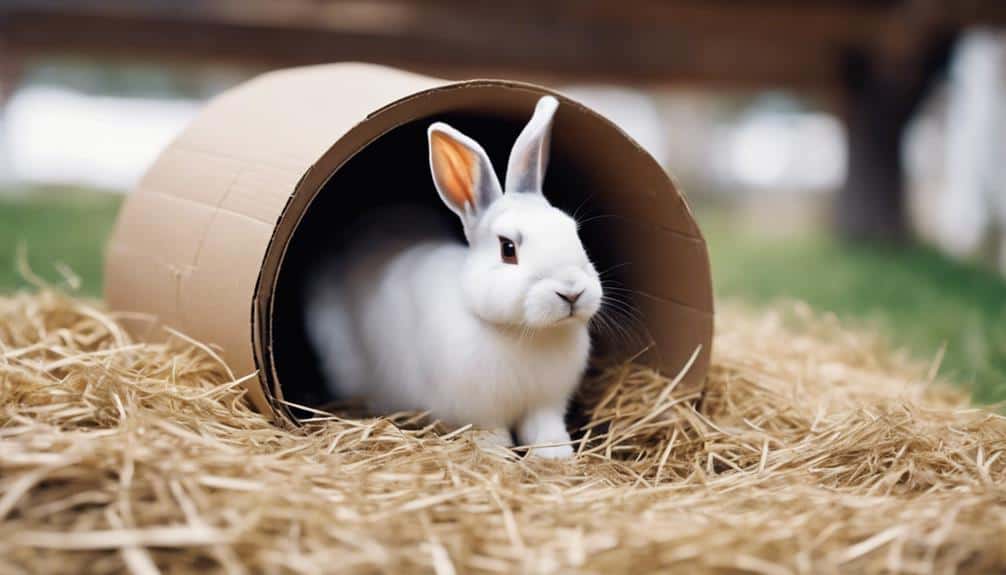
Similar to their wild counterparts, pet rabbits exhibit instinctual behaviors that reflect their natural tendencies for survival and social interaction.
As prey animals, rabbits have specific behaviors that help them thrive in the wild. Understanding these behaviors can provide insights into how to best care for your pet rabbit.
One of the key behaviors you may observe is vigilance. Rabbits are constantly alert for potential threats due to being prey animals. They may exhibit behaviors like freezing or escaping when they feel threatened, even in a safe home environment.
Another behavior you might notice is related to social structure. Wild rabbits live in groups to increase their chances of survival. Pet rabbits may display hierarchy behaviors when housed with other rabbits or even with their human caregivers.
You may also notice that your pet rabbit has a sensitive digestive system, just like its wild relatives. Rabbits have a sensitive digestive system that requires a specific diet and regular feeding schedule. Sudden changes in diet can lead to gastrointestinal issues, emphasizing the importance of providing a consistent and appropriate diet for your pet rabbit.
Active and Curious Nature
Your pet rabbit is a ball of energy and curiosity. They love to play, and it shows in their behavior. They’re always jumping, kicking, and nibbling on things.
This natural curiosity means they need room to roam and explore. Without enough space and stimulation, they can get bored and unhappy.
Playful Behavior Traits
Rabbits are naturally active and curious creatures. They need daily opportunities for exercise and mental stimulation to thrive.
When it comes to exercise, rabbits need space to hop, run, and play. They need at least 4 hours outside their enclosure daily to engage in natural behaviors like hopping and jumping, which is essential for their physical well-being.
Rabbits are also curious creatures that love to chew on objects to explore their surroundings. To keep them entertained and prevent damage, it’s essential to bunny-proof your home with safe chew toys and block access to cords and furniture.
Play is also crucial for rabbits. Offering a variety of toys and enrichment activities, such as puzzle feeders, hay towers, and cardboard boxes, can stimulate them mentally, preventing boredom and promoting a happy, playful demeanor.
A stimulated rabbit is a happy rabbit!
Exploration of Surroundings
Rabbits are active and curious creatures that need to spend time outside their enclosure every day. They need at least 4 hours of freedom to prevent boredom and stress.
To keep them safe, you’ll need to bunny-proof an area where they can roam around. This will let them do what comes naturally – hopping, jumping, and exploring their surroundings.
As natural foragers, rabbits love searching for food and toys. So, it’s a good idea to set up hiding places and puzzle feeders to keep them curious.
They also need a variety of safe things to chew on, like untreated wood and cardboard rolls. This will help keep their teeth healthy and keep them engaged.
But remember, safety is key. Rabbits can get hurt or escape if they’re not properly supervised during exploration.
Social and Affectionate Tendencies
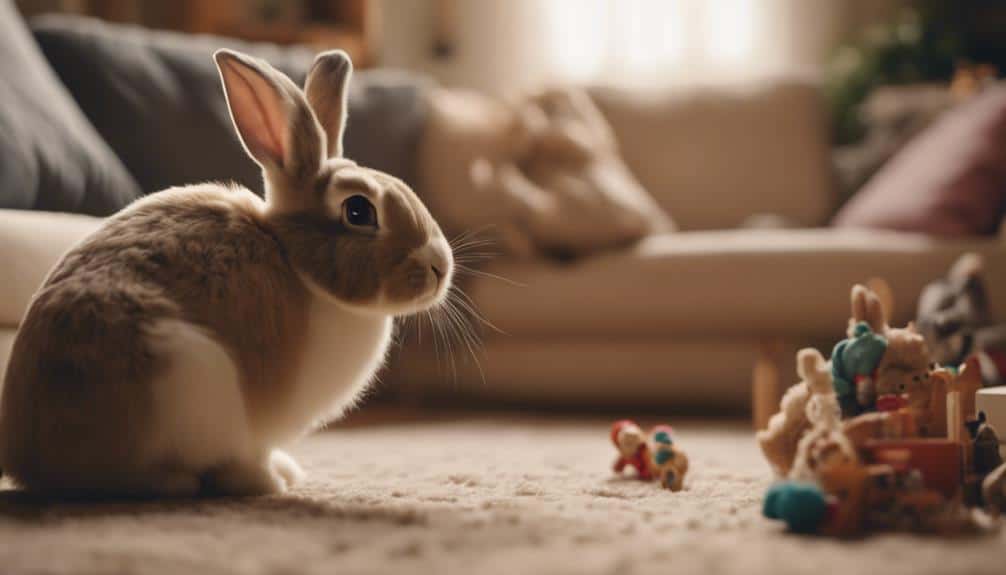
Rabbits are social animals that thrive on interaction. They form strong bonds with their owners, and they show affection in their own special ways. For instance, they might nudge you, lick you, or even give you a gentle nibble.
Playing with your rabbit is a great way to strengthen your bond and provide mental stimulation for them. It’s a win-win! By engaging in playful activities, you’ll create a deeper connection with your pet and help keep them happy and healthy.
Bonding With Rabbit
So you want to bond with your pet rabbit? The first thing to understand is that rabbits are social animals that thrive on companionship and affection.
When it comes to physical contact, rabbits are actually pretty fond of it. Gentle petting and cuddling can go a long way in building trust and strengthening your bond. So, don’t be afraid to hold your rabbit close to you – they’ll appreciate the affection.
Spending quality time with your rabbit is also crucial. This can be as simple as playing with toys, grooming, or just sitting next to them. The key is to interact with your rabbit daily, as this will help deepen your connection.
However, it’s also important to respect your rabbit’s boundaries. While they enjoy affection, they also have their limits. Be mindful of their cues and understand when they need some space. This will help create a more positive and trusting relationship with your pet rabbit.
Playful Interactions
Rabbits are social creatures that love spending time with their human companions. Playing with them is essential to strengthen your bond and nurture their affectionate nature. Providing toys like cardboard tubes or balls can encourage playful behavior and mental stimulation.
So, how do you engage in playful interactions with your rabbit? First, create a safe environment free of hazards like wires or small objects that they could chew on. Then, try activities like hide-and-seek with treats, gentle petting sessions, or even clicker training to stimulate their minds and keep them entertained.
Rabbits thrive on social interactions and will appreciate the time you spend playing with them. Just remember to respect your rabbit’s boundaries and preferences during playtime to foster a trusting and affectionate relationship.
Grooming and Hygiene Needs
Grooming and hygiene are crucial aspects of caring for your pet rabbit. They directly impact your furry friend’s health and happiness.
To keep your rabbit healthy and happy, there are a few key grooming and hygiene needs you should address.
First, brushing is essential. You’ll need a suitable brush to prevent matting and tangling, especially if you have a long-haired breed.
Regular brushing helps maintain their coat and prevents discomfort.
Next up is nail trimming. You’ll need to trim your rabbit’s nails every 4-6 weeks to prevent overgrowth.
Overgrown nails can lead to health issues and cause pain to your rabbit.
Make sure to use the right tools to get the job done.
Cleaning is also vital.
You should clean the litter box every 1-2 days and the cage weekly to promote hygiene and prevent health problems.
On top of that, regularly check your rabbit’s ears for wax buildup, their eyes for any discharge, and schedule dental checks to prevent complications from overgrown teeth.
Dietary Requirements and Habits
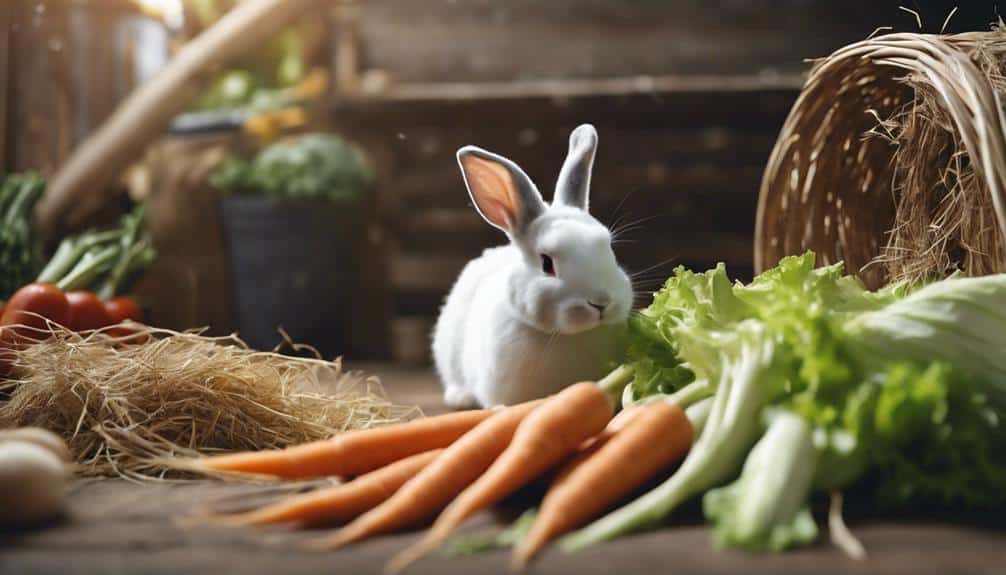
Rabbits need a diet that’s super high in fiber. I’m talking about 80% of their daily food intake being grass hay.
This hay is crucial because it helps keep their teeth healthy by encouraging them to chew and gnaw constantly.
When it comes to fresh veggies and fruits, you should limit them to around 10% of their diet. This is to maintain the right balance of nutrients.
Make sure you’re using high-quality pellets in their diet, and avoid giving them sugary foods. Their digestive system is pretty unique and needs a specific mix of fiber, protein, and calcium.
Some great veggie options include kale, broccoli, and romaine lettuce. As for fruits, carrots, apples, and pineapples make excellent treats, but only in moderation.
Just remember, rabbits have super sensitive stomachs, so introduce new foods slowly to avoid any digestive issues. Start with small amounts and one new item at a time.
Training Possibilities for Rabbits
Training pet rabbits can be an effective way to establish positive behaviors and strengthen the bond between you and your furry companion. Rabbits need mental stimulation, and training can provide them with the necessary enrichment.
So, what can you train your rabbit to do? Well, for starters, you can teach them to use a litter box. Rabbits are naturally inclined to choose a specific spot for their bathroom needs. By providing a litter box and consistently placing droppings inside, rabbits can learn to use the box for elimination.
If you’re feeling adventurous, you can even train your rabbit to walk on a leash. Some rabbits enjoy going for walks with their owners. Introduce a harness slowly and positively reinforce the rabbit when they wear it, and they’ll learn to walk safely by your side.
Training can also encourage positive behaviors in your rabbit. Through clicker training or positive reinforcement techniques, rabbits can learn to perform simple tricks like hopping on command or standing up. This not only provides mental stimulation but also strengthens the bond between you and your pet rabbit.
Health and Veterinary Care Aspects
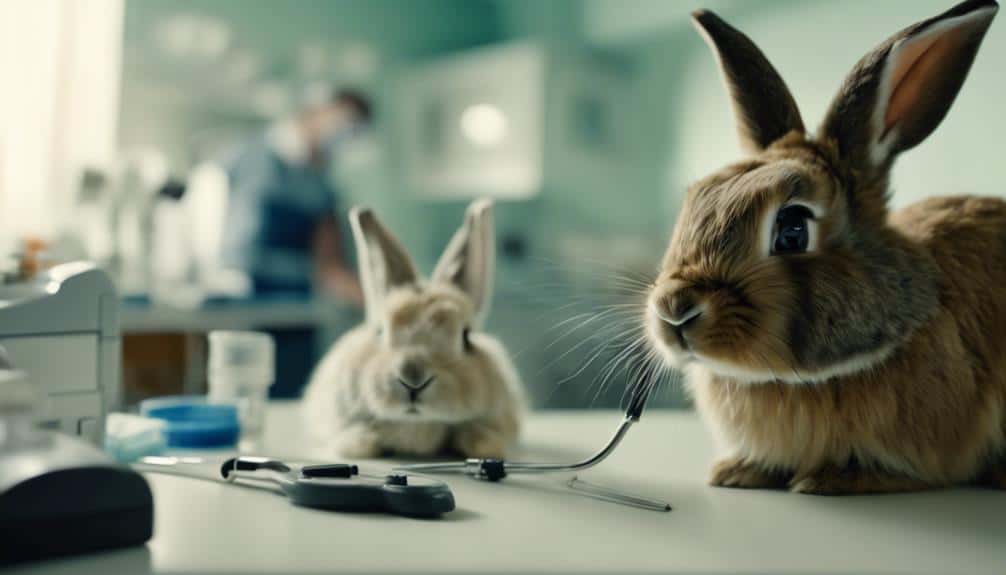
Rabbits have unique anatomy and health needs, which means they require specialized veterinary care. Regular check-ups with a vet are essential to prevent health issues and detect problems early. You see, rabbits are experts at hiding symptoms of illness, so it’s crucial to stay on top of their health.
Spaying or neutering your rabbit is vital for their long-term health and behavior. This simple procedure can prevent serious health problems like uterine cancer and aggression. Plus, it’s better for their overall well-being.
When it comes to vet care, you should be prepared for annual examinations, which can cost anywhere from $100 to $150. Emergency care, on the other hand, can be more expensive. Rabbits are prone to certain health issues, such as dental problems and respiratory infections. That’s why it’s essential to monitor their behavior and seek veterinary care promptly if you notice any changes.
Vaccinations against diseases like myxomatosis and viral hemorrhagic disease are available. You should work with a vet to establish the best vaccination schedule for your pet rabbit.
Here’s a quick summary:
| Vet Care | Spaying and Neutering | Common Health Issues |
|---|---|---|
| Regular check-ups | Essential for long-term health | Dental problems |
| Annual examinations | Prevents uterine cancer | Respiratory infections |
| Emergency care costs | Prevents aggression | Behavioral changes |
Conclusion
Having a pet rabbit is pretty amazing. It’s like having a gentle spirit hopping through your life, bringing joy and warmth to your home. These adorable creatures have unique personalities and can be incredibly affectionate. For those considering adopting a bunny, it’s important to equip yourself with some firsttime bunny owner tips to ensure a happy and healthy environment for your new friend. Understanding their needs for space, social interaction, and dietary requirements can make all the difference in creating a harmonious life together.
They’ve this soft fur, curious eyes, and a loving nature that creates a bond that’s both enriching and fulfilling.
When you provide proper care, attention, and affection, you get to watch your pet rabbit flourish and grow.
They become a cherished companion for years to come. It’s a really special experience that can bring a lot of happiness into your life.

